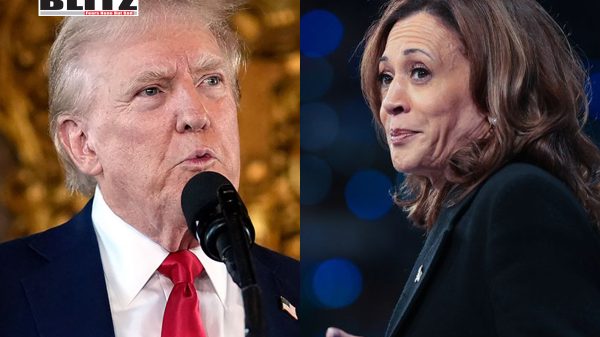Trump and Harris battle for Pennsylvania amid energy policy clash
- Update Time : Friday, October 11, 2024

As the November 5th election draws closer, former President Donald Trump has intensified his campaign efforts in Pennsylvania, delivering two significant speeches that highlighted his commitment to American energy production. Trump’s rallying cry of “drill, baby, drill” aimed to resonate with blue-collar voters in a state that has been a focal point of US industrial activity, particularly in the energy sector. His rhetoric not only targeted the current administration’s policies but also took aim at his Democratic rival, Vice President Kamala Harris, amid ongoing tensions surrounding energy production and immigration.
In his speeches, Trump vowed to unleash American energy by endorsing aggressive drilling and fracking practices, particularly in Pennsylvania, which boasts substantial shale gas reserves. “On day one I will tell Pennsylvania energy workers to frack, frack, frack, and drill, drill, drill, baby, drill,” Trump declared. This emphasis on energy production is not just a campaign slogan; it is a strategic move to attract voters in a state historically linked to coal mining and more recently, natural gas extraction.
Trump’s focus on fracking serves as a direct rebuttal to Harris, who, during her 2019 presidential campaign, supported a ban on the practice. Although Harris has since retracted her stance, claiming she would not advocate for a ban, Trump has seized on this issue to paint her as anti-energy. “If Harris is elected, day one, there’s no fracking, and that’s the end of Pennsylvania,” he warned, positioning himself as the champion of energy workers and traditional industries.
The economy remains a crucial theme in Trump’s campaign, particularly as he seeks to sway working-class voters. He accused Harris of being “grossly incompetent” and warned that if she were to win, energy costs would soar, saying, “If Kamala is reelected, your costs will go up and your lights will go out.” Trump further promised to cut household energy bills by 50 percent, aiming to alleviate the financial burdens many families face.
This economic narrative contrasts sharply with the current administration’s record. While Trump argues for a return to the energy policies of his presidency, the Biden administration has been achieving significant milestones in renewable energy production and has set records for oil and natural gas output. According to the Energy Information Administration, the U.S. is currently seeing robust production rates, which raises questions about Trump’s portrayal of energy independence during his tenure.
With less than a month to go before the election, polling data indicate a tightly contested race in Pennsylvania. Trump and Harris are neck-and-neck, both vying for the support of a crucial demographic. Pennsylvania is seen as a key battleground, especially given its historical significance in the Electoral College. While Harris has maintained a slight nationwide polling lead since mid-August, recent surveys show that Trump is outperforming her on economic issues, with a Gallup poll revealing he leads Harris 54-45 percent on this front.
This competitiveness underscores the importance of Pennsylvania as a working-class bastion where both candidates have focused their campaigning efforts. Trump has been particularly vocal in targeting immigration and crime, which he links to economic hardship, stating that undocumented migrants are “ruining your cities and towns.” This messaging is part of a broader strategy to evoke fear and position himself as the protector of American workers.
While Trump was rallying in Pennsylvania, Harris was largely off the campaign trail, focusing instead on Hurricane Milton, which was bearing down on Florida. She urged residents to evacuate and criticized Trump for spreading “unconscionable” misinformation regarding federal relief efforts. Harris’s campaign strategy appears to be one of cautious navigation through the challenges posed by Trump’s bombastic style, prioritizing her responsibilities as vice president while also preparing for a pivotal visit to Pennsylvania next week.
Adding star power to Harris’s campaign, former President Barack Obama is scheduled to rally for her on October 11. His presence is expected to boost enthusiasm and voter turnout, especially among demographics that were crucial to Biden’s victory in 2020. Harris’s campaign is also set to focus on other battleground states, including Nevada and Arizona, as she aims to solidify her position ahead of the election.
One of the most significant announcements from Trump during his Pennsylvania appearances was his decision to forgo a second debate with Harris. He made this announcement via social media, stating, “There will be no rematch.” This decision has raised eyebrows and could be seen as an attempt to avoid direct confrontation on a stage where Harris could effectively challenge his claims, particularly on energy policy and economic performance.
By sidestepping the debate, Trump maintains his narrative without the risk of scrutiny that often accompanies face-to-face exchanges. However, this strategy may also alienate some voters who expect candidates to engage directly on critical issues.
As the election approaches, the dynamics in Pennsylvania highlight the intersection of energy policy, economic messaging, and immigration rhetoric. Trump’s “drill, baby, drill” mantra resonates with many voters who feel overlooked by the current administration’s policies, while his attacks on Harris aim to reinforce his position as the candidate of the working class. However, the effectiveness of these strategies remains to be seen as both candidates prepare for a fiercely competitive final stretch leading to the election.
With polls indicating a close race and critical endorsements forthcoming, Pennsylvania is set to play a pivotal role in determining the outcome of the election. The emphasis on energy production, economic relief, and addressing the concerns of blue-collar workers will undoubtedly be at the forefront as voters make their decisions in the coming weeks. As both candidates ramp up their efforts, the focus on the economy and energy will likely shape the final narrative of this contentious campaign.











